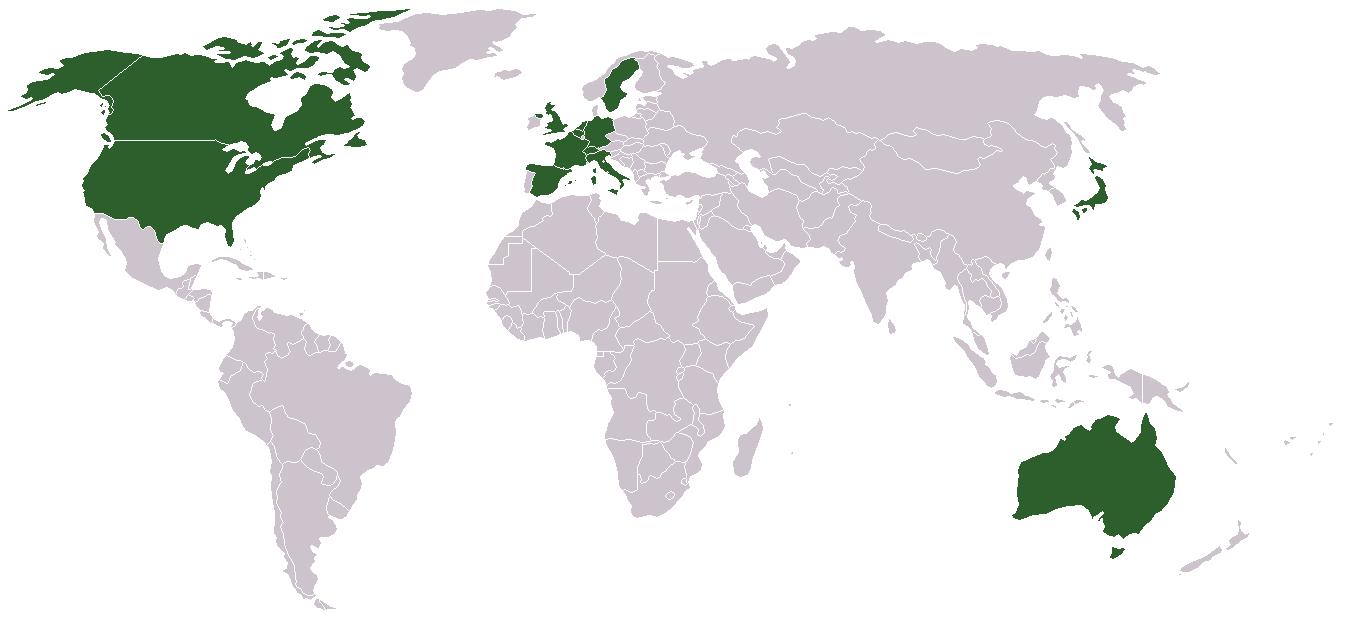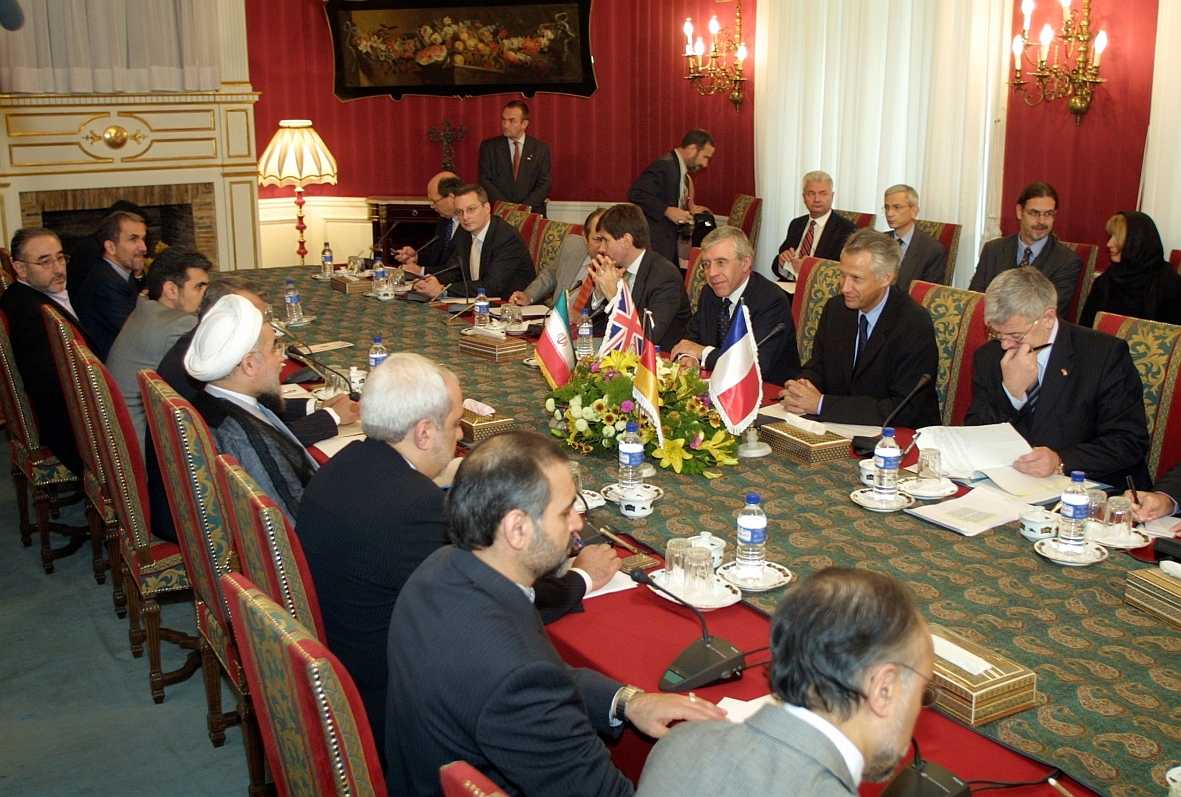|
Group Of Ten (economics)
The Group of Ten (G-10 or G10) refers to the group of countries that agreed to participate in the General Arrangements to Borrow (GAB), an agreement to provide the International Monetary Fund (IMF) with additional funds to increase its lending ability. History The GAB was established in 1962, when the governments of eight International Monetary Fund (IMF) members—Belgium, Canada, France, Italy, Japan, the Netherlands, the United Kingdom, and the United States—and the central banks of two others, Germany and Sweden, agreed to make resources available to the IMF with an additional $6 billion of their resources. The additional money was intended to allow the IMF to have increased lending resources. In 1964, the funds were used by the IMF to rescue the pound sterling. The G-10 grew in 1964 by the association of the eleventh member, Switzerland, then not a member of the IMF, but the name of the group remained the same. Activities The GAB enables the IMF to borrow specifie ... [...More Info...] [...Related Items...] OR: [Wikipedia] [Google] [Baidu] |
International Monetary Fund
The International Monetary Fund (IMF) is a major financial agency of the United Nations, and an international financial institution, headquartered in Washington, D.C., consisting of 190 countries. Its stated mission is "working to foster global monetary cooperation, secure financial stability, facilitate international trade, promote high employment and sustainable economic growth, and reduce poverty around the world." Formed in 1944, started on 27 December 1945, at the Bretton Woods Conference primarily by the ideas of Harry Dexter White and John Maynard Keynes, it came into formal existence in 1945 with 29 member countries and the goal of reconstructing the international monetary system. It now plays a central role in the management of balance of payments difficulties and international financial crises. Countries contribute funds to a pool through a quota system from which countries experiencing balance of payments problems can borrow money. , the fund had XDR 477 billion (a ... [...More Info...] [...Related Items...] OR: [Wikipedia] [Google] [Baidu] |
Bank For International Settlements
The Bank for International Settlements (BIS) is an international financial institution owned by central banks that "fosters international monetary and financial cooperation and serves as a bank for central banks". The BIS carries out its work through its meetings, programmes and through the Basel Process – hosting international groups pursuing global financial stability and facilitating their interaction. It also provides banking services, but only to central banks and other international organizations. It is based in Basel, Switzerland, with representative offices in Hong Kong and Mexico City. History The BIS was established in 1930 by an intergovernmental agreement between Germany, Belgium, France, the United Kingdom, Italy, Japan, the United States, and Switzerland. It opened its doors in Basel, Switzerland, on 17 May 1930. The BIS was originally intended to facilitate reparations imposed on Germany by the Treaty of Versailles after World War I, and to act as the truste ... [...More Info...] [...Related Items...] OR: [Wikipedia] [Google] [Baidu] |
Intergovernmental Organizations
An international organization or international organisation (see spelling differences), also known as an intergovernmental organization or an international institution, is a stable set of norms and rules meant to govern the behavior of states and other actors in the international system. Organizations may be established by a treaty or be an instrument governed by international law and possessing its own legal personality, such as the United Nations, the World Health Organization and NATO. International organizations are composed of primarily member states, but may also include other entities, such as other international organizations, firms, and nongovernmental organizations. Additionally, entities (including states) may hold observer status. Notable examples include the United Nations (UN), Organization for Security and Co-operation in Europe (OSCE), Bank for International Settlements (BIS), Council of Europe (COE), International Labour Organization (ILO) and International Crim ... [...More Info...] [...Related Items...] OR: [Wikipedia] [Google] [Baidu] |
Economic Country Classifications
An economy is an area of the production, distribution and trade, as well as consumption of goods and services. In general, it is defined as a social domain that emphasize the practices, discourses, and material expressions associated with the production, use, and management of scarce resources'. A given economy is a set of processes that involves its culture, values, education, technological evolution, history, social organization, political structure, legal systems, and natural resources as main factors. These factors give context, content, and set the conditions and parameters in which an economy functions. In other words, the economic domain is a social domain of interrelated human practices and transactions that does not stand alone. Economic agents can be individuals, businesses, organizations, or governments. Economic transactions occur when two groups or parties agree to the value or price of the transacted good or service, commonly expressed in a certain currency. Howev ... [...More Info...] [...Related Items...] OR: [Wikipedia] [Google] [Baidu] |
International Finance Institutions
An international financial institution (IFI) is a financial institution that has been established (or chartered) by more than one country, and hence is subject to international law. Its owners or shareholders are generally national governments, although other international institutions and other organizations occasionally figure as shareholders. The most prominent IFIs are creations of multiple nations, although some bilateral financial institutions (created by two countries) exist and are technically IFIs. The best known IFIs were established after World War II to assist in the reconstruction of Europe and provide mechanisms for international cooperation in managing the global financial system. Types Multilateral Development Banks A multilateral development bank (MDB) is an institution, created by a group of countries, that provides financing and professional advice to enhance development. An MDB has many members, including developed donor countries and developing borrower cou ... [...More Info...] [...Related Items...] OR: [Wikipedia] [Google] [Baidu] |
International Development
International development or global development is a broad concept denoting the idea that societies and countries have differing levels of economic or human development on an international scale. It is the basis for international classifications such as developed country, developing country and least developed country, and for a field of practice and research that in various ways engages with international development processes. There are, however, many schools of thought and conventions regarding which are the exact features constituting the "development" of a country. Historically, development was largely synonymous with economic development, and especially its convenient but flawed quantification (see parable of the broken window) through readily gathered (for developed countries) or estimated monetary proxies (estimated for severely undeveloped or isolationist countries) such as gross domestic product (GDP), often viewed alongside actuarial measures such as life expectancy. ... [...More Info...] [...Related Items...] OR: [Wikipedia] [Google] [Baidu] |
G10 Currencies
The G10 currencies are ten of the most heavily traded currencies in the world, which are also ten of the world's most liquid currencies. Traders regularly buy and sell them in an open market with minimal impact on their own international exchange rates. The origin of the term G10 currencies is not clear, however it may be derived from the G10 countries and their agreement to participate in the IMF General Arrangements to Borrow (GAB). There is no longer a one-to-one match between the G10 currencies and the G10 countries. The G10 currencies are: * Australian dollar (AUD) * Canadian dollar (CAD) * Euro (EUR) * Japanese yen (JPY) * New Zealand dollar (NZD) * Norwegian krone (NOK) * Pound sterling (GBP) * Swedish krona (SEK) * Swiss franc (CHF) * United States dollar The United States dollar ( symbol: $; code: USD; also abbreviated US$ or U.S. Dollar, to distinguish it from other dollar-denominated currencies; referred to as the dollar, U.S. dollar, American dollar, or collo ... [...More Info...] [...Related Items...] OR: [Wikipedia] [Google] [Baidu] |
Group Of Twelve
The Group of Twelve or G12 is a group of industrially advanced countries whose central banks co-operate to regulate international finance. Note that the G-12 consists of thirteen countries. It encompasses the initial ten members of the International Monetary Fund (IMF), which formed the original G10, adding Australia and Spain. In 1984, when Switzerland joined the G10 and G12, the names of the groups were not changed. See also * Group of Three (G3) * Group of Four (G4) * Group of Six (G6) * Group of Seven (G7) * Group of Ten (G10) * G10 currencies * Special drawing rights Special drawing rights (SDRs, code ) are supplementary foreign exchange reserve assets defined and maintained by the International Monetary Fund (IMF). SDRs are units of account for the IMF, and not a currency ''per se''. They represent a claim ... References International Monetary Fund International development International finance institutions Intergovernmental organizations Internati ... [...More Info...] [...Related Items...] OR: [Wikipedia] [Google] [Baidu] |
Group Of Seven
The Group of Seven (G7) is an intergovernmental political forum consisting of Canada, France, Germany, Italy, Japan, the United Kingdom and the United States; additionally, the European Union (EU) is a "non-enumerated member". It is officially organized around shared values of pluralism and representative government, with members making up world's largest IMF advanced economies and liberal democracies. As of 2020, G7 members account for over half of global net wealth (at over $200 trillion), 32 to 46 percent of global gross domestic product,Depending on whether nominal values or purchasing power parity is used. and 10 percent of the world's population (770 million people). Members are great powers in global affairs and maintain mutually close political, economic, diplomatic, and military relations. Originating from an ''ad hoc'' gathering of finance ministers in 1973, the G7 has since become a formal, high-profile venue for discussing and coordinating solutions to ... [...More Info...] [...Related Items...] OR: [Wikipedia] [Google] [Baidu] |
G6 (EU)
The G6 (Group of Six) in the European Union was an unofficial group of the interior ministers of the six European Union member states—France, Germany, Italy, Poland, Spain, and the United Kingdom—with the largest populations and thus with the majority of votes in the Council of the European Union. The G6 was established in 2003 as G5 to deal with immigration, terrorism, and law and order. In 2006, Poland joined the group, making it the G6. On the 29th of March 2017, the United Kingdom triggered Article 50, and left the European Union entirely on the 31st of January 2020, ending the G6, and beginning the G5 without the United Kingdom. Under the third pillar of the EU, Police and Judicial Co-operation in Criminal Matters, powers are largely intergovernmental; this is the one EU policy area where there is no Commission monopoly on proposing law. In other policy areas, the commission can usually create balance among the states, but in this one, the G6 has a great deal ... [...More Info...] [...Related Items...] OR: [Wikipedia] [Google] [Baidu] |
Big Four (Western Europe)
The Big Four, also known as G4, refers to France, Germany, Italy and the United Kingdom. France and the United Kingdom are official nuclear-weapon states and are permanent members of the United Nations Security Council with the power of veto, which enables any one of them to prevent the adoption of any "substantive" draft Council resolution, regardless of its level of international support. The United Kingdom is the only country of the Big Four which is not a member state of the European Union having ended its membership in 2020, pursuant to a referendum held in 2016. France, Germany, Italy and the United Kingdom are considered major European economic powers and they are the Western European countries individually represented as full members of the G7 and the G20. They have been referred to as the "Big Four of Europe" since the interwar period. The term G4 was used for the first time when French President Nicolas Sarkozy called for a meeting in Paris with Italian Prime Minist ... [...More Info...] [...Related Items...] OR: [Wikipedia] [Google] [Baidu] |
EU Three
The EU three, also known as EU big three, EU triumvirate, EU trio or simply E3, refers to France, Germany and Italy, a group that consists of the three large founding members of the European Union. It had also been used to refer to the grouping of France, Germany, and the United Kingdom, especially during the negotiations with Iran from 2003. EU-3 (EU founding states) Activities Germany, France and Italy were part of the original Inner Six founders of the EU along with Benelux nations. Negotiations for greater integration in the EU Determined to keep the European project intact in the wake of the UK's vote to leave the European Union in 2016, France, Germany and Italy called for greater integration in various trilateral summits in Berlin, Paris and Ventotene. More recently France, Germany and Italy have agreed a common position about the Paris climate agreement they have led a draft EU law to restrain Chinese acquisitions of European firms and technologies and they lead the EU ... [...More Info...] [...Related Items...] OR: [Wikipedia] [Google] [Baidu] |



_per_capita_in_2020.png)


